- Home
- S. D. Perry
Star Trek - TOS - Section 31 - Cloak Page 3
Star Trek - TOS - Section 31 - Cloak Read online
Page 3
The atmosphere on the bridge was subdued, certainly an emotional reaction to the loss of life. The captain sat stiffly in his chair, resting his chin in one hand as he stared at the main screen, at the powerless Sphinx floating nearby. When he noted Spock's appearance, he quickly stood.
"What have you got?"
"Assuming mat Dr. McCoy's DNA samples from the Sphinx's crew were properly gathered--and I have no reason to believe they were not--the human male responsible for shooting Captain Casden was not a member of his crew, nor is he registered in any Starfleet database. At present, I am unable to identify him."
The captain frowned, considering the information. The Enterprise's medical library was extensive, maintaining a current DNA database for all Starfleet personnel, as well as a vast, ever-growing medical catalogue of Federation members. Anonymity was not rare, but an unidentified human on a starship was. Starfleet required that all non-Federation passengers on warp-capable vessels be reported.
"What about the rest of the crew?" the captain asked.
"All accounted for. Thirty-seven, including Jack Casden."
"Last assignment?"
"That is unclear," Spock said. "It appears they were due for ship leave, following a routine equipment drop for the Vega colony. The closest Federation stations to their last reported location were Starbase 19 and Deep Space Station R-5, but they are not listed as having docked at either."
The captain's frown deepened. "That's a long way from here. Have you estimated their point of origin?"
"Uninhabited space, deep in the Lantaru sector," Spock replied. "No colonies or planets capable of sustaining life within two light years
The captain shook his head, an expression of frustration on his face. "It sounds like our best bet is to figure out who their mystery guest was, wouldn't you agree?"
A logical conclusion. "Indeed. I would like permission to return to the Sphinx, to see if I can ascertain the unidentified man's quarters. Perhaps a search of his belongings--"
"Permission granted. And see if you can help Mr. Scott hurry things along while you're over there, I expected his report twenty minutes ago." Spock nodded assent and turned to leave, just as the captain's intercom signaled. It was Mr. Scott, calling from the Enterprise transporter room.
"Report," the captain said, and Spock stopped to listen, curious. The unusual developments thus far had been most interesting, and it was reasonable to anticipate further irregularities in their investigation. What the engineer had to say, however, was entirely unexpected.
"Captain, the damage inside her wasn't anything out of the ordinary, mostly what we already thought," Mr. Scott said, his tone one of barely restrained excitement "Subspace communications were knocked out, and it does look like warp and navigation controls were the main targets ... but you'll never guess what we found on her hull--"
"Scotty ..." The warning was inherent in the captain's irritable interruption.
"The Sphinx has recently been exposed to a graviton field," the engineer said, sounding as though he believed his statement was of unusual importance.
The captain cocked an eyebrow at Spock, who took the initiative. "Mr. Scott, naturally occurring graviton fields are extremely common, and quite harmless. That a ship traveling over such a distance might be exposed to--"
"Aye, aye, I'm not daft, Mr. Spock," the engineer said, with great exasperation. Spock was about to state that he wasn't trying to insinuate otherwise when Mr. Scott expanded on his original statement
"It's the type of graviton field. A while ago, when we met up with the Romulans and, ah, borrowed their cloaking device--for a short time after we used it, the hull of the Enterprise had the same kind of readings. Exactly the same, and the readings are like no other, there's no mistaking them for something else. There's not any evidence of such a device being used by the Sphinx, but I'd bet my own mother's good name that she's been inside a Romulan cloaking field, and recently."
In spite of the confusing grammar--obviously, "she" was the Sphinx, rather than Mr. Scott's mother--the revelation was significant, to say the least. Whatever the circumstances in which the Sphinx was exposed to a cloak, the implications, for the Federation as well as for Captain Casden, were potentially devastating.
"Fascinating," Spock said, and from the look on the captain's face, he wasn't the only one who thought so.
Ever since the Enterprise's trip to the Gamma Hydra IV colony, and his fortunate resistance to the accelerated aging disease, Pavel Chekov was basically unnerved by even routine visits to sickbay. Not that he would ever admit to it, of course, he had his pride to think of, but those long, torturous hours of playing specimen had been hard to shake. And although he liked Dr. McCoy well enough, the words "just one more sample, Chekov" still haunted him occasionally, usually in anxiety dreams that also included him forgetting where his final Academy exam was being held.
Well, at least I'm near the beginning. Less time to dread it, he thought, standing outside sickbay. Right after Chase, just before Chesterton; five to ten minutes of physical and psychological testing and he could go back to the bridge, finished for another six months. It was where he wanted to be, anyway, considering what Mr. Spock and the captain had been talking about when he'd left The doors to sickbay swished open and Steve Chase stepped out, almost walking right into him. Embarrassed, Chekov excused himself, squared his shoulders, and stepped inside before the doors closed.
Christine Chapel was standing near the exam table, writing something on a clipboard. She looked up and smiled at him, her eternally sincere kindness easing some of his apprehension. A very nice lady, Nurse Chapel.
"Right on time, Mr. Chekov," she said, and nodded toward the table. "Dr. McCoy is just making some notes, but we can go ahead and get your blood pressure and weight..."
Chekov held his head high as he approached the table, reminding himself that Russia was the birthplace of modern medicine, that his own ancestors had no doubt helped create the diagnostic pad he was about to lie down upon. He boosted himself onto the table, the medical indicators coming to life as his head hit the pillow, loudly beeping and bleating his vitals into the room. Even he could tell that his heart rate was high, the skittering thum-thump audibly betraying his nervousness.
"Relax, Pavel," Nurse Chapel said, her voice soothing. "Breathe evenly, and try to think of someplace nice." She pressed a button on her clipboard and started recording. "I am relaxed," he grumbled, but took a few deep breaths anyway, forcing his muscles to unclench.
"Let me guess--the Russians invented meditation," Dr. McCoy said amusedly, entering from the next room.
Chekov shook his head. "No, but they perfected it, on Earth in the early twenty-first century. We are a very spiritual people, you know."
"I don't doubt it," McCoy said, picking up a tricorder and scanner from the nearby countertop and stepping closer to the table.
Chekov cast about for something to say, to keep his mind from dredging up anxious memories. "So ... does the medical staff also have their physical tests alphabetically?"
Nurse Chapel answered, smiling. "Actually, no. We just fit them in somewhere along the way. I had mine this morning, when Dr. M'Benga was filling in. Right between A and B."
"That's right--you were on the Sphinx, weren't you?" Chekov asked McCoy, curiosity out pacing his nervousness. "Did you hear about the stranger, the one who killed the captain?"
McCoy nodded, though his nurse seemed confused. "Captain Kirk just called," McCoy explained, frowning slightly at Chekov. "It seems there was no DNA match for one of the men on board ... though I'm sure gossiping about it isn't going to help matters along."
"Yes, sir," Chekov said, though he wasn't quite ready to give up. "I am going to help, though, just as soon as I leave here. I'll figure out who he is, no problem." "Sit up and take off your shirt," McCoy said, holding up his tricorder. Chekov was pulling his shirt over his head when the doctor caved. "And just how do you propose to do that, when he's not in the database?"
&
nbsp; Chekov smiled proudly. "I have connections ... and I'm also very good at tracking people down, through assignment files and reports. Everyone leaves a trail somewhere. It can be time-consuming, tracing someone like that, it takes patience and perseverance but some of history's greatest detectives were Russian, you know, and--"
"And I'm sorry I asked," McCoy said, scowling. "Hop off, and let's get you on the treadmill before you blow yourself out."
Nurse Chapel made a coughing sound and turned away, but Chekov wasn't offended, smiling at the doctor as they moved toward the endurance test, a prone treadmill exercise. Really, having something to talk about allayed much of his fear, even if it did spark a reaction in Dr. McCoy. Jealousy came in many forms, and Chekov had learned long ago to accept and transcend it; not everyone could take pride in their heritage, but after all, they couldn't help their own ancestry.
Chapter Four
When Jim called the briefing, Dr. McCoy had just finished administering his own physical, excusing Nurse Chapel early to dinner in order to maintain some privacy. Doctors were the worst patients, himself included, so he quickly ran his tests before Nurse West came on, knowing that she'd try to convince him to let M'Benga examine him; he didn't want to spend a single minute getting riled up because M'Benga--an excellent doctor, to be sure-ran the tests differently than he would have, or treated him like a patient. If he wanted to be patronized, he'd spend more time with Spock.
McCoy included his data along with the C and D patients', racking the samples and plugging his tricorder into the lab computer for analysis only seconds before Jim called.
"Kirk to sickbay."
McCoy stepped to the com. "Yes, Jim." "Bones, senior staff meeting, main briefing room. We need to talk about the Sphinx, and I want your opinion on something Spock found."
"What's that?"
A pause. "I'm not sure yet," Jim said.
Another mystery? The deaths, the stranger, the cloak reading ... they had enough to deal with already.
"I'll be right there," McCoy said, glancing over at the processing computer. His patience was limited when it came to his own health, but it would take at least an hour for the samples to be tested for all the standards, longer if the computer picked up something exotic. He'd go to the meeting, have dinner, and check the reports before bed, the prospect of an early evening feeling more like a necessity than a choice.
Admit it, Doctor, you're not happy with your endurance results. You're getting older, that's all, no shame in that.
McCoy ignored the smarmy inner voice as he left sickbay and headed for the briefing, but he couldn't entirely ignore the rather disheartening thoughts it had raised. His last full physical, only six months ago, he'd had the stamina and lung capacity of a man in his early thirties, not too bad for a forty-plus geezer such as himself... but the three minutes of pedal-pushing he'd just suffered had felt like running up the side of a mountain with weights on.
And now I'm tired and my feet hurt, he thought, stepping onto the turbolift, and if this is what I have to look forward to for the next hundred years or so.. . ... you could start watching what you eat and getting a little more exercise, you really should once you hit forty, the smarmy voice interjected, but he'd already heard enough from that particular collection of brain cells.
Hell with it, he thought as the turbolift stopped on deck three, the doors opening, he'd retire soon enough and take up napping full-time, maybe invest in one of those personal all-terrain transports that the very old hopped around in back on Earth. He'd make house calls in style.
As he walked down the deck's main corridor to the briefing room, nodding at a few passing crew members, he realized that his feet actually did hurt. They felt swollen, edemic; maybe all he really needed was a new pair of boots and a vacation. Jim was always pointing out how much he needed a decent holiday, which was true, but also a fine example of the pot calling the kettle black. The captain turned a deaf ear to his chief medical officer's advice about taking a break, talk about stubborn.
McCoy walked into the briefing room and took his seat, nodding pleasantly at Sulu and Uhura, who were chatting about one of the helmsman's botany experiments. Mr. Scott sat across the table from him, looking a little worn out. After the afternoon he'd had, McCoy wasn't surprised; the engineer worked miracles with warp drive, lucky for all of them, but excluding the captain's, his job was probably the most consistently stressful on board.
Jim and Spock showed up a moment later, Spock carrying a very small, very damaged-looking data chip that he set on the table before sitting down. The captain remained standing. McCoy recognized the look of absolute determination on Jim's face, his eyes sparking with an almost rebellious intensity, and wondered if he'd talked to Starfleet yet.
The captain nodded at Spock, who picked up the chip again, passing it to Mr. Scott.
"Several hours ago, I discovered this information chip on board the Sphinx," Spock said, "which I believe belonged to the unidentified killer of Captain Casden. The chip was in a storage locker in an unused compartment, along with packs of field rations, bottled water, and several tools--the hiding place of a stowaway saboteur, perhaps. Trace DNA from the unknown man was found on the locker, and on the chip itself. As you can see, the chip has been badly damaged, melted beyond the point of functionality."
Scott passed the chip to McCoy, who knew the punch line already. "And yet somehow, you managed to make it function, didn't you, Spock?"
The science officer turned his cool gaze to the doctor. "In fact, after several hours of work, I was able to salvage only two words from the corrupted chip ... though I do appreciate your high estimation of my skills, Dr. McCoy."
Before he could respond--a sentiment along the lines of don't-flatter-yourself--the captain stepped in, steering them back on track.
"The two words are 'from thirty-one," " Jim said, looking at each of them in turn. "Does that seem familiar to anyone? Think carefully, it could be important."
McCoy gave it a few seconds before shaking his head. He supposed he could come up with something given time, but it didn't ring any bells.
"It could mean anything," Sulu said, expressing exactly what McCoy was thinking. Scott and Uhura both nodded.
"As I've already told the captain, the computer listed one hundred seventy-one thousand, nine hundred and forty-two references to the number thirty one, not including star dates Spock said. McCoy opened his mouth to ask if Spock meant the ship's computer or his own brain when Jim intervened yet again.
"As all of you know, there are a number of questions regarding the Sphinx that we don't have answers to," he said firmly. "The unidentified man on the bridge, Mr. Scott's discovery of the graviton field, how she ended up a runaway in the first place--and now this. The answers are out there, somewhere--but as much as I want to find them, I received a text message from Starfleet less than an hour ago, a response to our 1500 report regarding the thirty-eighth passenger and the possible cloak connection ... telling me that they would be appointing another investigation team."
McCoy frowned, exchanging a confused look with Scotty, who shook his head in disbelief. It explained Jim's obvious discontent.
"That doesn't make any sense. Did they say why, Captain?" the engineer asked.
"No, but as soon as this meeting is over, I'm going to find out--a private communication link with the closest HQ station, so I can hear it for myself," Jim said, nodding at Uhura. "And since it ap40 pears I'm going to have to sell them on the idea of letting us continue, I was hoping one of you might recognize the 'thirty-one' reference. Anything I can use to convince them would be helpful, since our good record doesn't seem to be enough."
The captain controlled himself well, but the anger was there, barely hidden. McCoy knew from experience that Jim had already heavily invested himself in solving the mysterious tragedy--not necessarily his healthiest trait, getting emotionally involved so quickly, but it was also one of the things that made him an inspired captain.
There were
a few guesses as to what "thirty-one" might mean, a brief update from each department, and the meeting was over. Jim said he'd let everyone know Starfleet's final decision as soon as he heard it, and excused himself from the room with a curt nod. Uhura left with him, shooting an uncertain glance back at the rest of them as they stood up from the table.
"What's this all about, Mr. Spock, do you have an idea?" Scotty asked worriedly.
Spock hesitated before speaking. "I wouldn't care to speculate at this juncture, Mr. Scott."
"In other words, no," McCoy jabbed, but his heart wasn't in it. He still felt tired. The one consolation was that Spock seemed even less inclined to go the rounds.
"Gentlemen," Spock said, and left without another word. Sulu shrugged at them and quickly followed.
"Care for a bit of dinner, Doctor?" Scott asked, but McCoy shook his head, wiggling his sore toes.
"Actually, I think I'm going to go soak my feet," he said, and smiled a little. He was off-duty until morning, and all he had to look forward to for the next several days was logging patient numbers and test results for a large group of basically healthy people. He abruptly decided that his own physical results could wait until he. got a good night's sleep.
"I think I'm finally starting to figure out that I'm not as young as I used to be, Mr. Scott."
Scotty smiled ruefully. "Aye; ain't it a bugger?"
He asked Lieutenant Uhura to connect him with the nearest command base, only a sector away, and pipe it straight to the private office closest to the bridge. It had occurred to him that security considerations might have played a part in Starfleet's decision not to use the Enterprise, perhaps something they would reveal to him on a secured line.

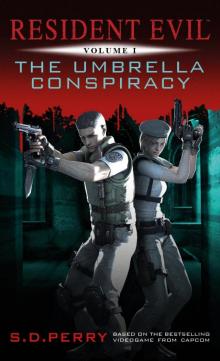 The Umbrella Conspiracy
The Umbrella Conspiracy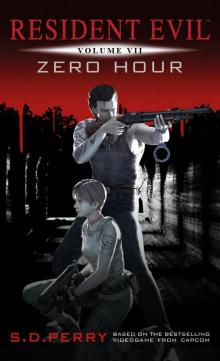 Zero Hour
Zero Hour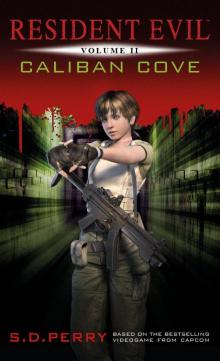 Caliban Cove
Caliban Cove Code: Veronica
Code: Veronica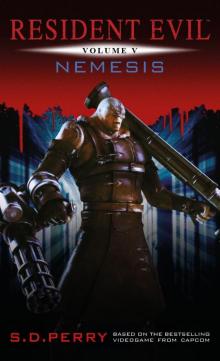 Nemesis
Nemesis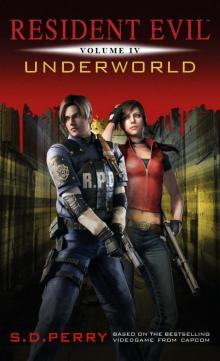 Underworld
Underworld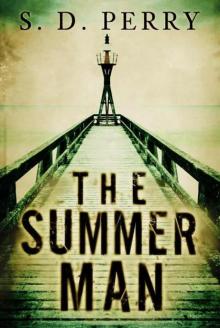 The Summer Man
The Summer Man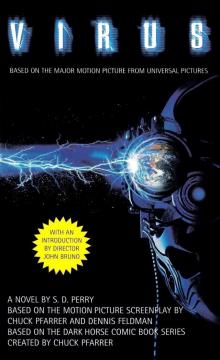 Virus
Virus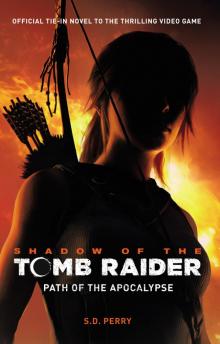 Shadow of the Tomb Raider--Path of the Apocalypse
Shadow of the Tomb Raider--Path of the Apocalypse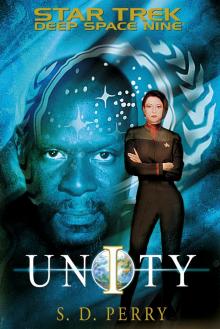 Unity
Unity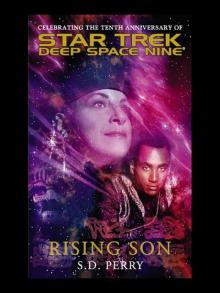 Rising Son
Rising Son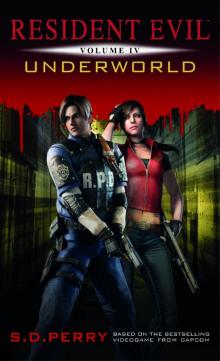 Resident Evil: Underworld
Resident Evil: Underworld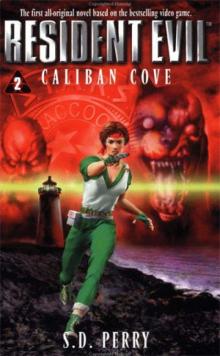 Resident Evil – Caliban Cove
Resident Evil – Caliban Cove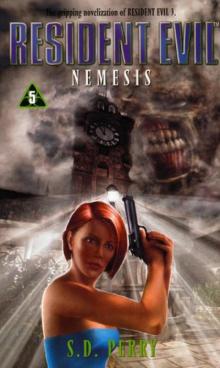 Resident Evil – Nemesis
Resident Evil – Nemesis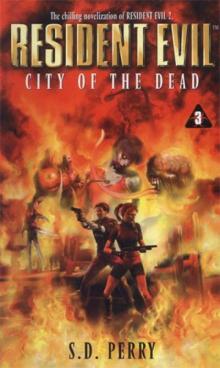 Resident Evil – City of the Dead
Resident Evil – City of the Dead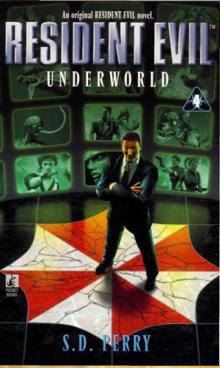 Resident Evil – Underworld
Resident Evil – Underworld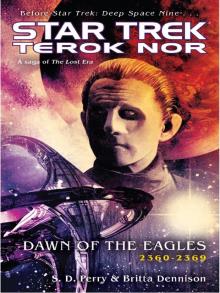 Star Trek: Terok Nor 03: Dawn of the Eagles
Star Trek: Terok Nor 03: Dawn of the Eagles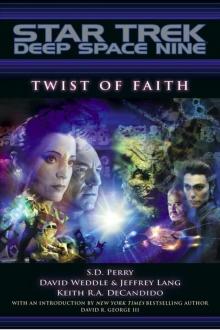 Twist of Faith
Twist of Faith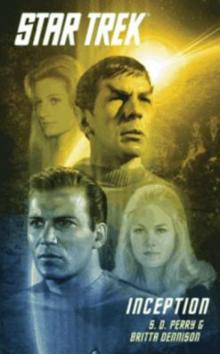 Star Trek: Inception
Star Trek: Inception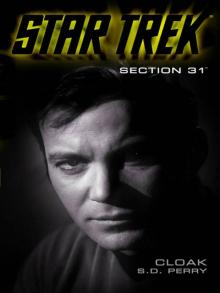 Cloak
Cloak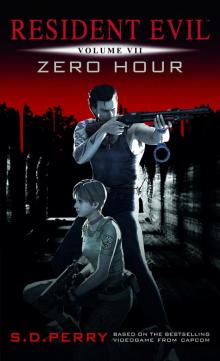 Resident Evil
Resident Evil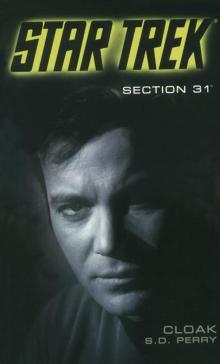 Star Trek - TOS - Section 31 - Cloak
Star Trek - TOS - Section 31 - Cloak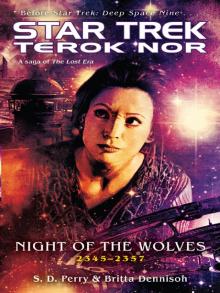 Star Trek: Terok Nor 02: Night of the Wolves
Star Trek: Terok Nor 02: Night of the Wolves